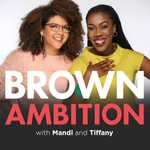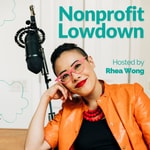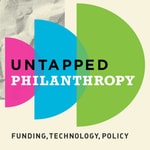Philanthropisms – Details, episodes & analysis
Podcast details
Technical and general information from the podcast's RSS feed.

Philanthropisms
Rhodri Davies
Frequency: 1 episode/16d. Total Eps: 89

Philanthropisms is the podcast that puts philanthropy in context. Through conversations with expert guests and deep dives into topics, host Rhodri Davies explores giving throughout history, the key trends shaping generosity around the world today and what the future might hold for philanthropy. Contact: [email protected].
Recent rankings
Latest chart positions across Apple Podcasts and Spotify rankings.
Apple Podcasts
🇬🇧 Great Britain - nonProfit
26/07/2025#23🇬🇧 Great Britain - nonProfit
25/07/2025#9🇬🇧 Great Britain - nonProfit
24/07/2025#5🇬🇧 Great Britain - nonProfit
23/07/2025#81🇬🇧 Great Britain - nonProfit
22/07/2025#59🇬🇧 Great Britain - nonProfit
21/07/2025#44🇬🇧 Great Britain - nonProfit
20/07/2025#40🇬🇧 Great Britain - nonProfit
19/07/2025#29🇩🇪 Germany - nonProfit
19/07/2025#74🇬🇧 Great Britain - nonProfit
18/07/2025#13
Spotify
No recent rankings available
Shared links between episodes and podcasts
Links found in episode descriptions and other podcasts that share them.
See allRSS feed quality and score
Technical evaluation of the podcast's RSS feed quality and structure.
See allScore global : 58%
Publication history
Monthly episode publishing history over the past years.
Philanthropic Foundations: history, role and controversy
Season 1 · Episode 66
jeudi 5 septembre 2024 • Duration 01:23:39
In this episode we take a deep dive into the world of philanthropic foundations. What are they, how did they evolve, and what light can their history shed on continuing debates about the role of foundations in our society today? Including:
- What are the key features that define philanthropic foundations?
- Are these consistent around the world and across time periods?
- Why do foundations often act as a lightning rod for wider concerns about philanthropy?
- The historical origins of western foundations: ancient Roman fideicommissium or Islamic waqf?
- The growth of the charitable trust in medieval England
- Reformation, industrialisation and the slow secularisation of charitable foundations
- "Zombie" foundations in C19th London and calls for reform
- The birth of the giant general purpose foundations in 20th century America: why was this so surprising, and why has it proven so influential?
- Growing concerns about foundation abuses in mid C20th US, and the passage of the 1969 Tax Act
- The "Dead Hand of the Donor" and critiques of perpetual endowments
- Do foundations deserve their tax advantages? Should they be made to work harder for them?
- Do endowed foundations have a unique role to play in taking risks and driving innovation when it comes to addressing society's needs? How much of what foundations currently do lives up to this ambition?
- Are foundations an important expression of philanthropic pluralism? Why is the legitimacy of this pluralism being questioned more than ever before?
- Do foundations need to be more open and transparent? If so, about what?
- Are foundations "repugnant to the whole idea of a democratic society", or can they play a positive role in strengthening democracy?
- How do concerns about "tainted" wealth affect the legitimacy of foundation philanthropy?
Related links
- 3 part Why Philanthropy Matters essay series on philanthropic foundations: Part 1 - Defintions; Part 2 - History; Part 3 - Current Debates
- Philanthropisms podcast episode on pluralism
- Philanthropisms podcast episode on gratitude and recognition
- Philanthropisms podcast episode on tainted donations
- Fozia Irfan's "Transformative Philanthropy" paper
- Rhodri on the "What Donors Want" podcast talking discussing whether UK foundations should be subject to a minimum payout requirement
- Tobias Jung's chapter, "The Nonprofit Sector’s ‘Rich Relations’?
Foundations and their grantmaking activities"
Pamala Wiepking: Understanding Global Generosity
Season 1 · Episode 65
jeudi 18 juillet 2024 • Duration 54:19
In this episode, we sat down to talk about how we understand and measure global generosity with Pamala Wiepking, Stead Family Chair in International Philanthropy and Associate Professor of Philanthropy at the Lilly Family School of Philanthropy at IUPUI in Indianapolis (and also Professor of Societal Significance of Charitable Lotteries at the Vrije Universiteit Amsterdam, the Netherlands). Including:
- Is “philanthropy” a helpful word in a global context?
- If not, why not: do people not understand it, or do they understand it, but with particular connotations?
- If we use terms such as ”generosity” instead, is there still a use for “philanthropy” to denote a specific subset of that activity? (And if so, what subset?)
- Is there any danger that if we broaden our definitions of generosity too far in our desire to make them more universal, they will become meaningless?
- Do we need a “grand theory” of global generosity?
- What are the obvious gaps, biases and limitations in our current knowledge about generosity at a global level?
- Is it useful to distinguish between philanthropic giving based on traditions of charity/altruism and other forms of giving grounded in traditions of mutualism/reciprocity? Or should we blur these distinctions within a wider conception of generosity?
- How important is it to “decolonize philanthropy research” as well as expanding our definitions of generosity?
- Is the role of philanthropy academics simply to observe and analyse giving and generosity, or to encourage it?
- Are current measures of global generosity useful? If not, why not?
- Apart from the challenges of finding appropriate definitions, are there other barriers to measuring generosity at a global level?
- Are we in the midst of a "generosity crisis", or is the apparent decline in giving in places like the US, the UK and the Netherlands merely a reflection of the fact that the way we measure generosity has failed to evolve in step with how people actually choose to give?
- Should the policy mechanisms we currently use to encourage and support philanthropic giving (e.g. tax reliefs) be adapted to encompass a broader range of activities that fit within an expanded definition of generosity?
Related links
- Pamala's personal website
- The call for contributors to the forthcoming volume on “Philanthropy: Key debates and contending perspectives”, edited by Pamala and Femida Handy
- Pamala's Voluntas article on "The Global Study of Philanthropic Behavior".
- Pamala's article for HistPhil, "An inclusive study of global philanthropy: how can we overcome definitional, cultural and geographical boundaries?"
- 2022's "Philanthropy in a Different Perspective: Voices from Ethiopia, Nigeria and Serbia", a volume edited by Pamala & Femida Handy.
- Rhod's WPM article asking "Is the way that we talk about philanthropy and civil society holding us back?"
- Rhod's WPM article "Why Are We So Bad at Measuring Giving and Why Does It Matter?"
Krystian Seibert: Developing philanthropy in Australia
jeudi 14 mars 2024 • Duration 59:13
In this episode we talk to Australian philanthropy expert Krystian Seibert about his work with the Productivity Commission's Public Inquiry on philanthropy, including their recent draft report "Future Foundations for Giving" which sets out findings and recommendations on developing philanthropy in Australia. Including:
- How did the Productivity Commission report on philanthropy come about, and what is the aim behind it?
- What is the history and current context for civil society in Australia?
- Do recent critiques of philanthropy in the US and elsewhere resonate in the Australian context? (E.g. that philanthropy exacerbates inequality, that it is anti-democratic, that some sources of wealth are “tainted” etc.)
- Are the levers for using government policy to influence philanthropy necessarily limited by the fact that it is inherently something that exist independently of govt and is based on the free choices of individuals?
- Is there anything we can do to be more ambitious when it comes to using policymaking to build a stronger culture of philanthropy?
- Does government have a wider role in setting a positive narrative about the role of giving (even if this doesn’t involve actual funding or policy change?)
- What does the current system for tax relief on donations in Australia look like
- What is the underlying rationale for governments offering tax relief on donations?
- Why does the productivity Commission report conclude that the current system is “not fit for purpose” and what is recommended to remedy this?
- Why is it so important to have a philanthropic funding body owned and operated by Aboriginal and Torres Strait Islander communities? (Is a practical thing about money not currently getting to where it needs to, or a more principled argument based on claims of justice?)
- Does the negative result of the 2023 referendum on establishing the Aboriginal and Torres Strait Islander Voice mechanism bolster the case for a philanthropic entity of kind outlined, or does it make it make it harder to achieve?
- Do private ancillary funds correspond that what we would call foundations in the US/UK context?
- How much pressure is there currently in Australia to consider increasing the minimum payout requirements?
- What role can government play in improving the data landscape around philanthropy?
- How could this help foster more/better giving?
Related Links:
- Productivity Commission inquiry on philanthropy
- The draft report, "Future Foundations for Giving"
- Philanthropy Australia's response to the PC draft report
- Krystian's Alliance article about the draft report
- Krystian's 2017 article "Walk with us, not over us: how to build philanthropy’s social license"
- Krystian's SSIR article, "Cultivating Legitimacy in Philanthropy"
UnCharitable Special (feat. Stephen Gyllenhaal)
jeudi 29 février 2024 • Duration 01:28:03
On this episode we take an in-depth look at the 2023 documentary film "UnCharitable", based on the book and TED talk by Dan Pallotta, which argues that the current funding model for the nonprofit sector is broken. Including
-An interview with the Director of the film, Stephen Gyllenhaal, in which he talks about how the film came about, what he learned through making it, and what the plans are next for taking the film's aims forward.
-A critical assessment of the film
-Some short perspectives from a few of the attendees at a recent screening of the film held in London (organised by Why Philanthropy Matters and kindly hosted and made possible by Vitol Foundation): Natasha Friend from Camden giving, Amy Braier from Pears Foundation, Angela Kail from NPC and Ruo Wu and Alison Talbot from Winckworth Sherwood.
Related links
- UnCharitable movie website
- Third Sector column about the film by Ian MacQuillin (another attendee at the recent WPM screening event)
- WPM guest article by Tom Le Fanu on the overhead myth
- WPM short guide on core cost funding
- WPM short guide on impact measurement
- Philanthropisms podcast with Mary Rose Gunn
- Philanthropisms podcast with Dr Ewan Kirk
- Philanthropisms podcast on Philanthropy & Business
David Clarke: Wealth Shared
Season 1
jeudi 15 février 2024 • Duration 01:02:02
In this episode we discuss the 'Wealth Shared' project that took place in 2023 in Liverpool, UK - in which 12 randomly-selected citizens of the L8 postcode were given the chance to decide how £100K was given away. We talk to project founder David Clarke, who provided the money and designed the approach, and also hear briefly from Anne-Marie Gilleece, one of the 12 participants who got to make the decision. Including:
- What was the thinking behind the project?
- What primarily drove the design? Was it a desire to make distribution of money more effective; concerns about democratic legitimacy; or an interest in the value of the process for those participating?
- How much latitude did the project allow participants in terms of choosing where the money went? What was the thinking behind any restrictions?
- What was most interesting or surprising about the deliberation meetings?
- Were there any moments of conflict? How were these handled?
- Were there any challenges in interacting with participants as the donor?
- How did data inform the decision making?
- To what extent were participants’ choices informed by awareness of the political context?
- How much of what happened was specific to the context of Liverpool?
- How important was the strong sense of existing identity associated with the L8 postcode in giving the group cohesion? Or would the shared responsibility of giving away money be enough to bind a more disparate group around a sense of common purpose?
- Was it a surprise that the group decided to give to organisations based locally?
- What discussions did the group have about how the money should be given? (i.e. did they want to stipulate that it had to be used in certain ways, or were they happy to give unrestricted gifts?)
- Was there discussion about effectiveness? What form did this take?
- Did the grant recipients see particular value in this process?
- Is this something that only works if driven by an individual donor who is willing to cede control? Or are there elements of the approach that could be adopted by institutional funders as well?
- Could a similar approach could work in other places?
Related Links
- Wealth Shared website
- The final report and evaluation of the project
- Article about the project in the Big Issue
- BBC News article about Austrian heiress Marlene Englehorn, who is doing a similar project involving randomly-selected citizens in deciding how to give money away.
- WPM article "In an ideal world, would there be no philanthropy?" (which was prompted by a discussion during one of the Wealth Shared sessions!)
- WPM article on radical philanthropy
Mary Rose Gunn: Supporting Small Charities to Thrive
Season 1
jeudi 1 février 2024 • Duration 52:13
In this episode we speak to Mary Rose Gunn, Founder and CEO of The Fore, about why small charitable organisations are so valuable and how to support them to thrive. Including:
- How did The Fore come about, and what does the organisation exist to do?
- Is there too much competition and not enough collaboration in the charity sector? Why is this?
- How can we design more collaborative approaches? What kinds of resources and infrastructure will this require?
- How can philanthropic funders collaborate with the public sector more effectively?
- Do small charities have unique value (i.e. compared to larger ones?)
- Is one of the biggest barriers to philanthropic funders supporting small charities simply finding them in the first place? What can we do to overcome this barrier
- Why is core cost funding so important for small charities and civil society organisations?
- What do small charities tend to use the money from core funding for?
- Should all small charities be aiming to grow and achieve scale, or is this not always the right goal? How can an organisation know?
- How important is resilience for small charities? What does this mean in practice?
- How big a challenge currently is burnout for leaders of small charities?
- What is required to make core cost funding work from the funder’s point of view?
- Is part of the problem with the “overhead myth” that donors want some measure of the effectiveness of their giving, and in the absence of compelling evidence they are forced to rely on unhelpful financial measures like overhead ratios? What can we do to provide them with better metrics?
- What challenges do current grant application processes present for charities?
- Does this particularly disadvantage smaller organisations?
- When making relatively small grants, how do you maximise their impact?
- What additional support beyond just the money do small charities need? How does Fore provide this?
- What is required to make skilled volunteering work effectively?
- What kind of due diligence do donors need to do on small charities in order to fund them in a trust-based way?
Related Links:
- The Fore
- Mary Rose's essay for the Law Family Commission on Civil Society
- Mary Rose being interviewed by Pioneers Post
- Mary Rose's blog post, "The Inefficiency Myth – debunking a damaging small charity stereotype"
- WPM guest article from Tom Le Fanu, "Why we (still) need to move beyond “overheads” as a way of judging charities"
- WPM article, "If You Were a Philanthropist, What Would You Do?"
- Philanthropisms podcast with Dr Ewan Kirk
- Philanthropisms podcast with Emma Beeston & Beth Breeze
- Philanthropisms podcast with Tris Lumley
ERNOP: Connecting Philanthropy Academia & Practice #4
jeudi 18 janvier 2024 • Duration 01:02:27
In the fourth edition of our partnership with the European Research Network on Philanthropy (ERNOP), we hear from more academics whose work is featured in the latest batch of short, practitioner-focused ERNOP Research Notes. In this episode we hear from:
- Pamala Wiepking (Lilly Family School of Philanthropy, IUPUI & Vrije Universiteit Amsterdam) and Arjen De Wit ( Vrije Universiteit Amsterdam ), about developing a conceptual model to understand the benefits of core funding for nonprofit organisations
- Ali Body (Centre for Philanthropy, University of Kent) about integrating philanthropy as a teaching tool within university courses.
- Rita Kottasz (Kingston University), about understanding what motivates people to give to food banks, and about creating a typology of disintermediation in the nonprofit sphere.
Related links:
- Pamala and Arjen's paper "Unrestricted funding and nonprofit capacities:
Developing a conceptual model" and the Research Note version. - Ali's paper (with Emily Lau), "Teaching student philanthropy—Possibilities for practice within the UK higher education sector" and the Research Note version.
- Rita's paper (with Roger Bennett & Rohini Vijaygopal) "Who Gives to Food Banks? A Study of Influences Affecting Donations to Food Banks by Individuals" and her paper (with Ian MacQuillin, Juniper Locilento & Neil Gallaiford) on "A typology of disintermediated giving and asking in the non-profit sector" and the Research Note version
- The previous editions of the Philanthropisms/ERNOP series: Number 1, number 2, and number 3.
J. Bob Alotta: AI, Philanthropy & Civil Society
Season 1
jeudi 4 janvier 2024 • Duration 46:24
In this episode we talk to J. Bob Alotta - SVP, Global Progammes at Mozilla - about what is happening at the intersection of artificial intelligence, philanthropy and civil society. Including:
- What role can open source approaches play in ensuring that AI is developed in a way that benefits society? What is Mozilla funding in this area, and how much other philanthropic funding is currently focussed on these kinds of initiatives?
- How optimistic should we be about the potential for developing open source approaches to AI at a time when there is such huge commercial competition surrounding the technology? What will be required to make this happen?
- What is the aim of the new $200m Philanthropic Coalition on AI that Mozilla has joined?
- Why has Mozilla chosen to use the approach of funding individuals through its Fellowship program?
- What are some of the key opportunities that AI might bring for philanthropy and civil society?
- How much work is there to be done in terms of getting the datasets required to make philanthropy applications of AI feasible?
- Is the focus of some philanthropic funders and donors on the perceived existential risks of Artificial General Intelligence a distraction from the more immediate short term challenges the technology poses?
- What role has Effective Altruism played in making X risks the focus of philanthropic funding for AI research?
- What should we be focussing on as the most important immediate challenges with AI?
- Does the current turmoil at OpenAI suggest that trying to combine commercial drivers and philanthropic goals is a real challenge when it comes to the development of AI? Does Mozilla’s own hybrid structure have lessons for how we can do this well?
- Does the voice of civil society organisations (and the people and communities they serve) get heard enough in current debates about AI?
- Do CSOs currently have the knowledge and capabilities to engage in these debates? If not, what new support and infrastructure do they need to do so (and what role can philanthropy play in achieving this?)
Related Links:
- Mozilla Foundation
- Mozilla Fellowships
- Mozilla Foundation's article, "Trustworthy AI Funding Principles: Learnings and Opportunities from Mozilla Foundation’s 4+ Years of AI Grantmaking"
- Philanthropisms podcast 2024 tech predictions
- Philanthropisms podcast episode on Philanthropy, Civil Society & AI
- Why Philanthropy Matters article, "What will 2024 bring for philanthropy and civil society?"
- WPM article, "OpenAI and the challenges of combining profit with purpose"
- Rhodri's Alliance article, "Artificial intelligence is coming for philanthropy"
2024 Predictions for Philanthropy & Civil Society - Part 2
jeudi 14 décembre 2023 • Duration 01:03:41
As is now tradition, in our final episode of the year we take a look at some of the key themes and trends in philanthropy and civil society right now and offer some thoughts on what the coming year might bring. In this second of two parts, we focus on the opportunities and challenges that technology will bring. Including:
- Will Twitter (oh, alright, "X") finally give up and die? Will we settle on a replacement? And should we even do that, or should we rethink the whole idea of social media?
- Will the ongoing rise of influencer philanthropy, epitomised by MrBeast, bring more criticism and more pushback?
- Will the emergence of generative AI and its integration into already-ubiquitous tools lead to new opportunities for nonprofits in terms of productivity, accessibility and creativity?
- Will we see further scandals over nonprofit use of AI-generated content?
- Will legal and ethical concerns about infringement of copyright and intellectual property rights in the creation of genAI tools have any impact on their use by nonprofits?
- Will recommender algorithms start to reshape how people make choices about giving?
- Will the "boomers" vs "doomers" narrative about the future of AI become entrenched, and will this create challenges for CSOs trying to highlight more immediate AI risks?
- Are new AI capabilities going to turbocharge cybersecurity risks?
- Is there any point caring about crypto and blockchain any more?
- Will the metaverse develop in a meaningful way, or is the required infrastructure still lacking?
- Are we beginning the transition towards a radically different future of work as a result of automation? What might this mean for philanthropy and civil society?
- Will we see more philanthropic funders get involved in debates over population slowdown? Does this risk taking them into ethically challenging ground?
RELATED LINKS:
- Philanthropisms episodes on "philanthropy, civil society & AI" and "cryptophilanthropy: boom or bust?"
- WPM article on the chaos at OpenAI
- WPM article on MrBeast and Philanthropy
- Rhodri on The Bunker podcast discussing MrBeast
- WPM article on philanthropy, population debates and eugenics
- Rhodri's Alliance article "Artificial Intelligence is coming for philanthropy"
- WPM article on philanthropy and the metaverse
2024 Predictions for Philanthropy & Civil Society - Part 1
jeudi 14 décembre 2023 • Duration 01:10:35
As is now tradition, in our final episode of the year we take a look at some of the key themes and trends in philanthropy and civil society right now and offer some thoughts on what 2024 might bring. In this first of two parts, we explore developments in the wider political and economic landscape, as well as taking a deep dive into what to expect in philanthropy, everyday giving, grantmaking and the nonprofit sector. Including:
- Given the number of major elections worldwide, and the ongoing rise of political populism, will 2024 be a pivotal year from democracy?
- Will there be further attempts to roll back hard fought aspects of social progress?
- Will be see a global economic slowdown, or recession?
- Is there a danger of climate becoming politicised as an issue at the exact moment we need more concerted action?
- Will we move from talking about a decline in giving to taking action to address the challenge?
- Will we see further focus on the need to broaden our understanding of philanthropy and to learn from other cultures?
- Are concerns about the risks of allowing philanthropy to become 'platformised' going to become more acute?
- Will giving in response to conflicts test the limits of what we are willing to count as philanthropy?
- After a long period in which “efficiency” and “rationality” has been emphasised, are we seeing people reclaim the importance of "heart" in philanthropy?
- Will we see more criticism of billionaire wealth? What will this mean for elite philanthropy?
- Will the continued emergence of next gen donors start to shift philanthropic norms?
- Will the rise of China and India start to shift the centre of gravity of global philanthropy?
- Will we see more instances of donors withdrawing support for recipients over disagreements about positioning on contentious issues?
- Will we see a shift in debates about tainted donations, with more emphasis on accepting money as a default?
- Will we see the idea that companies can combine profit with purpose come in for further scrutiny (or criticism)?
- Will the continuing loss of infrastructure start to put a strain on the charity sector?
- How will traditional charities and funders respond to the growing prominence of social movements?
Related Links:
- WPM article series on the nature and role of foundations
- WPM guest article from Natasha Friend on embracing emotion in philanthropy
- WPM article on Leah Hunt-Hendrix and "radical philanthropy"
- WPM article, "What is Philanthropy For?"
- Reflections on the Gates Foundation 2023 Greater Giving Summit
- Philanthropisms podcasts with Joshua Amponsem, Sara Lomelin and Elizabeth Barajas-Román









